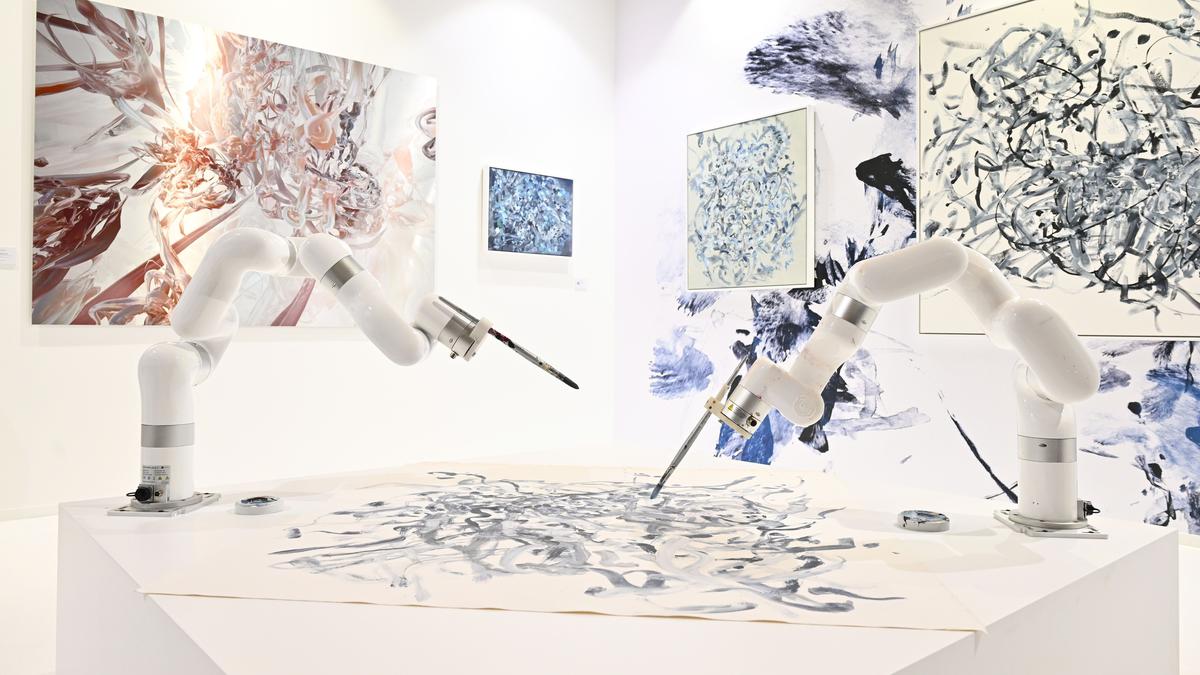
Art Dubai: Taming the digital
The Hindu
One of the takeaways from the third edition of Art Dubai Digital is that AI is not evil. It is the intention behind it that matters
The world became one in the smallest, darkest room at Madinat Jumeirah last week — and it happened because of AI. For four days at Art Dubai, Canadian-Korean digital artist Krista Kim stood inside Heart Space, an immersive installation within a mirror-panelled room with four podiums and a giant LED screen. Supported by the Zurich-based bank Julius Baer, this is where visitors could co-create an artwork.
Kim instructed visitors to place their thumbs on tiny capsule-shaped sensors that could read their heartbeats. The hardware would assess their mood and assign a colour. Within seconds, their heartbeats would join a sea of waves gently lapping against each other on the screen. “What we do is extract the algorithm and create colour, wave form and speed that is co-relating to your unique algorithm,” she explained.
Heart Space is the latest invention born of Kim’s “techism” philosophy, which espouses an urgent need for infusing “humanism” in the discourse around technology through art. “We’ve collaborated with a biometric technology company that creates an AI algorithm for your heartbeat,” she said. “When I was listening to the CEO talk about creating these ‘signature keys’, I realised that this security mechanism can be used as a paint brush.”
And because it’s demonstrated like this, people can walk away thinking AI is not evil, she added. “They can realise that it’s always the intention behind AI that matters; that it is possible to engage it in a way that is responsible, ethical, humane. That is something we can teach through art. The more artists that engage with AI, the better for humanity. It’s crucial right now.”
Anyone who’s been to Dubai in the last decade could attest to the emirate’s cosmopolitan techtopian ambitions. Art has rapidly gained importance as a marker of its cultural identity, beginning with the formation of Art Dubai in 2007 and now a burgeoning scene with independent galleries, collectors and artists from around the world. The city has also become the unlikely playground for art and technology to meet in unexpected ways.
“It’s sort of an organic development,” said Alfredo Cramerotti, co-curator of Art Dubai Digital, a section dedicated to exploring digital art in all its forms, now in its third year. “The ecosystem of advanced technology has made art production more accessible. It has allowed the world of artistic production to expand because, up to 50 years ago, if you didn’t live in a major cultural centre, like New York, London or Paris, you could forget about being an artist.”
For him and co-curator Auronda Scalera, the new capitals of digital art might be Hong Kong, Miami, Zurich. “The whole GCC [Gulf Cooperation Council] region is open to technology to produce new cultural forms,” he said. “It is really curious because the majority of these artists come from the Global South,” added Scalera, which tied in neatly with the overarching theme of this year’s edition of the art fair.

‘Love Scout’ K-Drama review: Han Ji-min and Lee Jun-hyuk lead a mature, refreshing workplace romance
‘Love Scout K-Drama’ review: A refreshing, mature workplace romance












